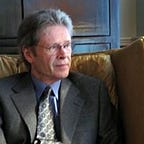Does Positive Patriarchy Exist?
How would we know?
Sylvio Bertarelli tends his land with his son, grows their own grano capelli, their ancient wheat, olives, makes their own olive oil, Cannonau wine, fresh goat and sheep cheeses, cured meats, flatbreads, pane carasau, a flat bread that would last months on a shepherd’s journey. These foods, these traditions remain unchanged and he lives in same way his father and his father’s father.
I asked him if he had any stress. He paused, surprised by the question, thought for a few minutes trying to imagine what was stressful for him. Finally he said his biggest stress is a goat gone missing in the night or a baby cow or goat.
We ate and ate — the olives, peppers, flat bread, strong cheeses, cured meats, fresh goat cheese, puffed little bread pockets, pistoccu fritto, pork and sheep roasted over open wood fire, culurgiones with fresh tomato sauce, minestrone with potatoes, pasta and zucchini, malloreddus pasta with sausage, fresh tomatoes from the garden, and Seadas — little fried cheese pockets drizzled with honey for dessert, all washed down with fresh Cannonau red wine served in a clay pitcher.
The whole family runs both the farm and the restaurant which is simply their house.
It is why this place has the longest lived males and is one of the Blue Zones where many live well over 100 years old.
— Mark Hyman, MD
*
… we live in…a patriarchy….In this case, achievement is not fueled by the pleasure, love, or creativity in what we are doing. It is driven by compulsion. This compulsion can never be satisfied. (This achievement mentality has been developed out of all that is motherless and unfeminine and reflects the total lack of a positive father, a positive patriarchal influence in our culture.)
— Bud Harris, PhD
We men are not thriving in this patriarchy we accept and perpetuate. We learn quite young that achievement is more important than enjoyment. We trap ourselves in a culture that views pleasure negatively. Love, beauty, delight, enjoyment of the simple pleasures of the earth are somehow secondary or non-existent in our culture. It’s insane but it’s normal to us. Everything is based on separation, not interrelationships. The idea of quick and easy satisfaction has seduced us into an ersatz experience of living on earth. We’re appeased by cheap imitations of life.
The few societies where people live close to nature and to each other hold up a mirror to us, showing us how far we have gotten from an intelligent life. They look exotic, unachievable, impossibly foreign. We put them under our microscope, hoping to discover their secret. We try to import their “health regimes.” We try to discover their secret ingredient and put it into a pill we can sell. We make longevity the goal rather than living joyfully every day. We can’t imagine giving up our way of living with its burdens and its pace.
The essence of a natural, relational life is lost in translation in our minds. We see it through the lens of our assumptions. It’s a paradigm that will collapse, though, when we try to extract the key, the heart of it, the “secret sauce.” Since we automatically think in terms of buying and selling, we miss the real picture of what a true and whole life is or could be.
We have certain disadvantages by virtue of our learned blindness. Seeing the world from the vantage point of our conditioning handicaps us and yet, in looking at Sicilian societies, we’re looking at our own history. It’s not as foreign as African or even Native American social constructs would be. How far we have gotten from ourselves!
We now face the question of how we can find a way to live both naturally and rationally. Seeing where we have come to is only the first step. How will we go forward from here in a way that doesn’t destroy the world and us with it? This question is going to be with us for the foreseeable future.
